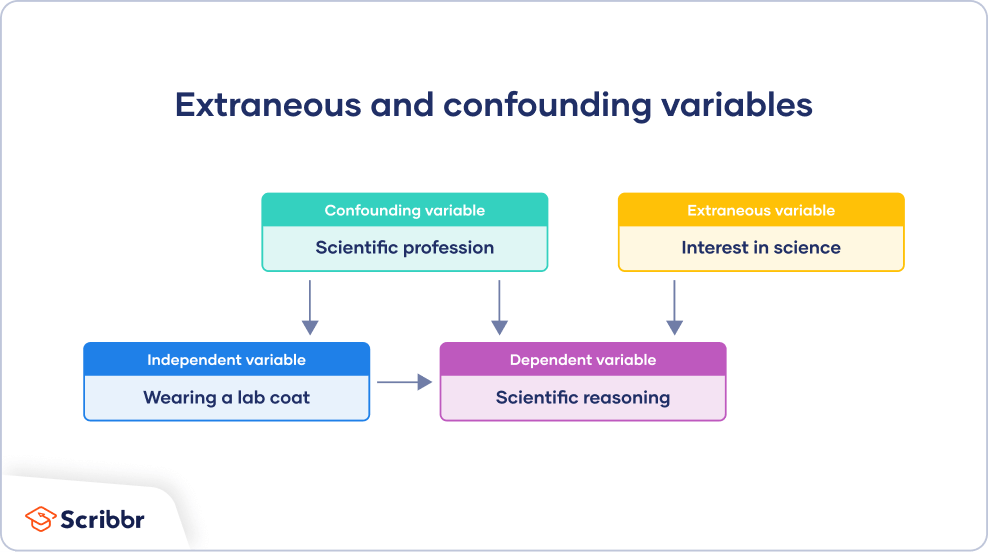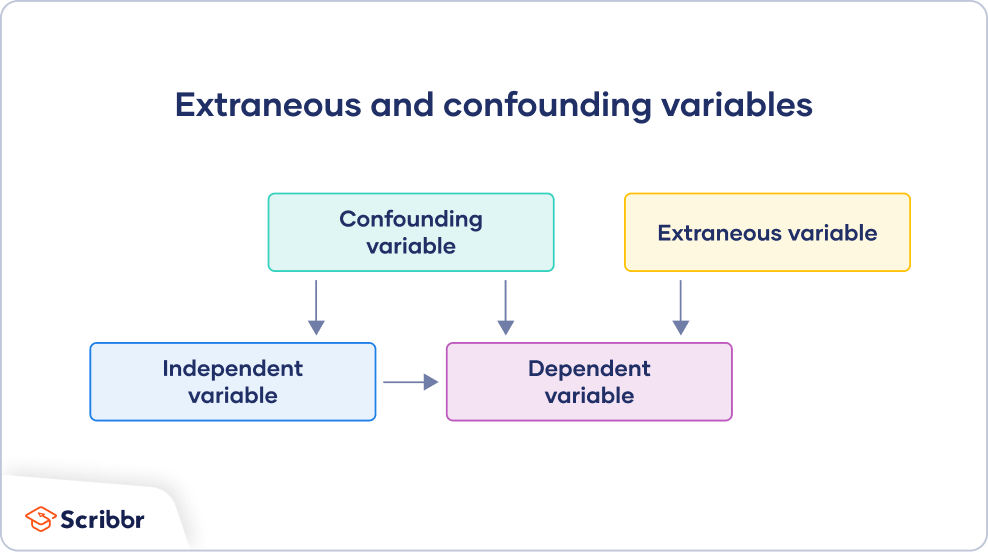Explain Different Types of Extraneous Variables in Detail
In this approach treatments are randomly assigned to the experimental groups. Experiments contain different types of variables.

Extraneous Variables Examples Types Controls
IIBMS MBA CASE STUDY ANSWER SHEETS Explain about Extraneous variable Confounded relationship Experimental groups and Treatments in the context of research design.

. - time of day - temperature - noise What is the definition of confounding variables. In this article Ill cover the differences between five different variables. They are linked with dependent and independent variables and can cause spurious association.
Two or more quantitative variables Ex. However extraneous variables are crucial to include in a study because of how they can confound or muck up a studys results. -Method used to teach reading and reading achievement -Counseling approach and level of anxiety.
Examples of different types of extraneous variables are. Extraneous variables are defined as any variable other than the independent and dependent variable. Some extraneous variables can be anticipated.
Types of experimental variables. A confounding variable varies with the independent variable whereas general extraneous only means that it adds error or noise to findings butnot in a predictable fashion. Confounding variables are a specific type of extraneous variable.
-Reading achievement and mathematics achievement - Amount of time watching television and aggressiveness of behavior. In an experiment on the effect of expressive writing on health for example extraneous variables would include participant variables individual differences such as their writing ability their diet and their gender. These factors can include background differences mood anxiety intelligence awareness and other characteristics that are unique to each person.
For example in a clinical trial for a topical treatment in psoriasis the concomitant use of moisturizers might be a confounding variable. In this technique the extraneous variables which cannot be eliminated are kept constant in order to make their effect same during the entire experiment. Extraneous variables are any factors that can influence an experiment that arent the independent variables that you are testing.
Different times produces the same score. Others are revealed during the course of the experiment. It then proceeds to describe and discuss synonyms for the terms independent variable and dependent variable including treatment intervention predictor and risk factor and synonyms for dependent variable such as response.
Sources of extraneous variability can be. Ironically many extraneous variables are not specifically interesting to the researchers. A confounding variable is a special type of extraneous variable.
Scores on the other half 1 mark and the higher the correlation the more reliable the. Examples might include height distance or number of items. One categorical and one quantitative variable Ex.
Those that are anticipated can often be addressed by using specific experimental design techniques discussed in the next chapter. We at Answer sheets offer all types of online academic assistance be it homework help coursework help case study help Assignment help Project Reports Thesis Research. We will present you with some of the main types of experimental variables their definitions and give you examples containing all variable types.
So a confounding variable is a. Scores on half the items 1 mark are correlated with. John Spacey July 17 2018.
An extraneous variable is any variable that youre not investigating that can potentially affect the dependent variable of your research study. A confounding variable is a type of extraneous variable that not only affects the dependent variable. Ii Making Conditions Constant.
This article begins by defining the term variable and the terms independent variable and dependent variable providing examples of each. What types of extraneous variables are there. - participant variables - situational variables What are participant variables give examples.
Dependent independent latent observed and extraneousnuisance. Largely there are four approaches by which the effect of the extraneous variables can be controlled. These extraneous variables are related to the individual characteristics of each study participant that may impact how they respond.
In this technique extraneous variables are eliminated from the experimental setting. It is assumed that the extraneous factors are. Demand characteristics results are biased by participants responding to cues and behaving artificially reducing the reliability of the results.
Extraneous variables that might unintentionally influence the outcome include parental support prior knowledge of a foreign language or socioeconomic status. Ideally all extraneous variables are controlled using techniques such as controlled variables negative control groups and positive control groups. - age - intelligence - gender - race - religion - culture What are situational variables give examples.
Quantitative variables Quantitative variables are any data sets that involve numbers or amounts. External reliability means that the same person taking the questionnaire at two. 5 Types of Extraneous Variables.
Experimenterexperimenter effects the experimenters bias that causes participants to behave in a certain way. Confounding variables are extra variables which can have an effect on the experiment. It sounds simple enough but there are actually different types of variables and understanding the difference is one of the keys to properly interpreting your findings and avoiding common mistakes.
Your hypothesis is that this variable causes a. Those that are revealed during the experiment aid in interpretation of the research findings. Two specific types of extraneous variables are called mediator and moderator variables.
In the process of research there is a need to control the extraneous variables as they add an alternative explanation of the results. These are the factors or conditions that you manipulate in an experiment.

Extraneous Variables Examples Types Controls

Extraneous Variables Examples Types Controls Simply Psychology

No comments for "Explain Different Types of Extraneous Variables in Detail"
Post a Comment